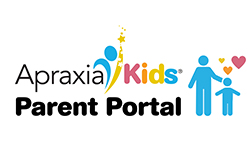Many speech-language pathologists are now offering alternative methods to provide children with therapy at a distance because of the need for virtual services during COVID. It has become a viable option that will continue to be used in the future.
What is telepractice?
Telepractice utilizes technology to allowed children to continue to receive speech and language therapy during the COVID-19 outbreak. There are three types of telepractice delivery models, however, the one that is most common for treatment of children with CAS (and may be covered by your insurance plan) is called synchronous telepractice. This type of telepractice service involves your speech-language pathologist working with your child via both audio and video connection in real time. This means your child will interact with his or her speech-language pathologist via both video and audio to simulate an in-person visit.
What features does telehealth offer?
Many telepractice portals are interactive, allowing for children to participate in therapy activities via their computer screen. For example, some technology allows for children to play computer games as well as participate in structured therapy activities via the click of a mouse or touch screen. Boom Learning offers Boom Cards which are another telepractice resource. The card decks consist of popular, interactive, computerized learning activities allowing children to manipulate their screens during telepractice sessions to keep them engaged and motivated. Many portals also let clinicians share screens or mirror other devices such as an iPad. Screen sharing allows for children to participate in therapy by using websites such as PBS Kids, Education.com, and ABCYa!
If your child is not ready to sit in front of a computer screen to participate in therapy services or cannot manipulate a computer mouse, a coaching model may be a more effective means for treatment to be delivered. Via this model, your speech-language pathologist can help coach you on how to elicit speech production targets while at home.
Will my insurance pay for telehealth services?
Due to COVID-19, many private insurers have agreed to cover telehealth services for speech and language therapy. However, coverage and regulations regarding telehealth varies widely across states. It is important to check with your speech-language pathologist as well as insurance company to determine if telepractice will be covered during this outbreak. If therapy is not covered, it is recommended that you reach out to the American Speech-Language-Hearing Association and local government officials to push for coverage of these necessary services.
Is telehealth right for my child?
Not all children will be candidates for telehealth, however, many children with CAS may benefit from these services. As a profession, we know that applying the Principles of Motor Learning (PMLs) to treatment for children with CAS is imperative to improve motor speech skills. Luckily, with the exception of providing “hands on” prompting, PMLs can be applied to telepractice sessions fairly easily. In addition, telepractice allows for parents to be active participants in sessions as the speech-language pathologist coaches families on how to best work with their child while at home. It is recommended that you consult with your speech-language pathologist to see if you child may be a candidate for this type of services.
What families are saying about telepractice?
At my private practice in Connecticut, many parents are happy that their son or daughter can continue to receive speech therapy services while social distancing at home. Some are amazed at how attentive and engaged their children are with our interactive portal. Parents also report that their children look forward to these sessions, enjoy the games played and are making progress on their speech therapy goals from the comfort of their own home. One family noted that their child’s speech increases in intelligibility after our sessions. Many families have stated that telepractice provides them with some normalcy during a very uncertain time. Overall, both myself, my clinician and our families are extremely pleased with the experience thus far.
By Jennifer Sakowicz, M.S., CCC-SLP, Owner of Pediatric Communication Center in Newington, CT
Recognized by Apraxia-Kids for Advanced Training and Clinical Expertise in Childhood Apraxia of Speech
January, 2022
